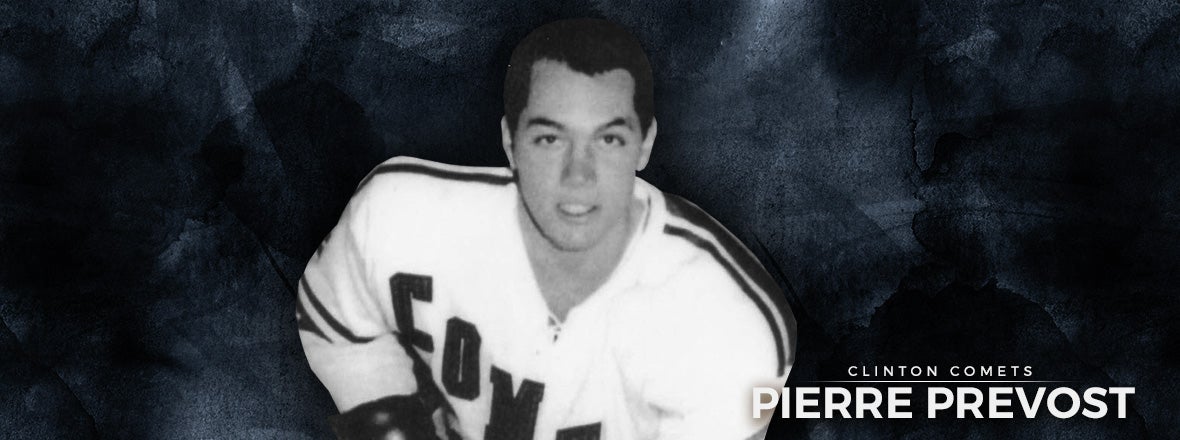
CLINTON COMETS & COMMUNITY - PIERRE PREVOST
Mar 28, 2017If the walls of the Arena over on Kirkland Avenue in Clinton could speak, Pierre Prevost's name would be in conversation.
Two full seasons skating in Clinton (1967-68 & 1969-70) is all it took for the Cornwall, Ontario native to remain in the Utica area – for keeps.
Two Walker Cup championships were won, injuries were overcome and lasting friendships were made, as a 20-year old followed his hockey dreams. Coming to the "tough" league, as Prevost labels the Eastern Hockey League during his playing days, meant there were a few hurdles to overcome.
"I was drafted by the Minnesota North Stars during the expansion (In 1967, the NHL expanded from six to 12 teams). I had two good years in juniors with Cornwall," says Prevost. "Wren Blair was the coach and general manager in Minnesota. I went to their NHL training camp. From there, I was sent to Memphis."
For the short time that Prevost was dispatched to Memphis, all 5'7" 150 lbs. of him, it was just a holding pattern until getting his orders to report to Clinton. There was no ice time for Prevost with the South Stars. A half century later, Prevost isn't short on details when remembering his first thoughts on his introduction to Clinton.
There were no stories to be had of what to expect in a new community. With a roster led by veterans known to locals simply as Kane, Anderson and Speck, Prevost recalls coming to the Comets with another rookie – Jim Cotnam.
"When I got here [Clinton], the arena and town reminded me of being in Cornwall," tells Prevost.
From the onset of his tenure as a Comet, Prevost experienced just how physically punishing the pro game could be. "A couple years in the league (EHL) takes a toll on you. I took pucks to my ankles; played hurt – a lot. One time, I had to take a shot (Novocaine) in my big toe, just so I could put my skate on. Pat Kelly called the doctor for that one. And I still remember the bruises. It was rough and dirty."
A non-hockey injury caused Prevost to miss an entire season in 1968. What should have been skating in a second straight championship season, turned out to be a full year off, dealing with a dislocated left hip and right ankle.
"Around Christmas time, I started skating," recalls Prevost of his rehabilitation period. "All I could do is be ready for next season."
Prevost, who currently drives a school bus for the Whitesboro Central School District and is "always there" for Utica Comets' Friday and Saturday games at The AUD, offers no shortage of stories on his former coach and teammate Pat Kelly. When on the ice with his coach, and fellow defenseman, Prevost freely admits being nervous.
"Once the game started, everything kicked in. I got the puck to the forwards as quick I could. We [Comets] had such a good team. Those guys up front did all the work," explains Prevost.
A dislocated shoulder during a game against the New Haven Blades would be one injury that Prevost recalls never recovering from while with the Comets. With no security, Prevost was placed on waivers and picked up by the Blazers. After just 20 games with the Blazers, Prevost's career would come to a halt.
"I didn't want to travel. You were always tired," states Prevost. "You learned how to played tired. But, we [Comets] never fell apart."
Another Kelly memory that jumps out at Prevost was the absence of water on the Comet’s bench on game nights. There were ice cubes to crunch on. That was it, as compared to today's choices offered to the players before, during and after games.
It would be after Prevost's third and final season in the EHL that he decided to remain in the area. With a job in Oneida, and recently married, Prevost became a permanent United States resident in 1972. The rest, as they say, is hockey history.
Unlike some athletes who have been a part of championship celebrations leading to their ring(s) getting locked away in a safe box, Prevost isn't shy about wearing his Walker Cup bling. "I wear it all the time when we go out," Prevost reveals.
Prevost tells a tale, like all athletes, of wanting to keep his career going; but what the mind wanted and the body could offer were going in opposite directions. Barely into his 20s, the magnitude of how the game of hockey chews at the body and chips away at equipment, forced Prevost into making the difficult decision of leaving the game.
"Winning wasn't everything," Prevost proclaims of his time spent with the Comets. Collecting a couple of championships while in town, however, does set up a good debate.
Written by Don Laible



